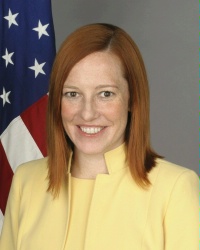BBG Watch Commentary
 The Voice of America (VOA) did not have a report on its English news website about U.S. State Department spokesperson Jen Psaki voicing concern Thursday in response to a journalist’s question over the rule of law in Turkey.
The Voice of America (VOA) did not have a report on its English news website about U.S. State Department spokesperson Jen Psaki voicing concern Thursday in response to a journalist’s question over the rule of law in Turkey.
According to news reports which surfaced in Turkey earlier this week, Turkish Prime Minister Recep Tayyip Erdogan fired hundreds of police officers in the latest purge of the justice system following an investigation into alleged high-level government corruption. State Department spokesperson Jen Psaki said Thursday that “the United States supports the desire of the Turkish people for a legal system that meets the highest standards of fairness, timeliness, and transparency in civil and criminal matters, where no one is above the law and where allegations against public figures are investigated impartially.”
A search of the VOA Turkish website did not show that it had a report on yesterday’s State Department’s comment on Turkey, although the service may have reported on it in its TV program. In general, VOA Turkish Service offers extensive reporting and analysis of U.S.-Turkish relations. Like many VOA news and foreign language programs units, it is starved for resources by the overblown VOA executive staff and its bureaucracy. Understaffed VOA language services are unable to monitor every State Department and White House news briefing and every Congressional hearing.
Among more than 40 Voice of America language services, apparently none had news yesterday or today on their websites on U.S. concerns over the legal system in Turkey. Many of these countries to which these VOA language services direct their news programs have highly corrupt judicial systems and press censorship. One of them is Iran.
VOA central newsroom is supposed to provide such news for the English website and VOA language services. This often does not happen. VOA is also frequently hours late behind Al Jazeera, BBC, RT (Russia Today), and even Iran’s state media outlets for international audiences, in reporting on breaking U.S. news, as in yesterday’s news story on the political scandal involving New Jersey Governor Chris Christie.
The news of the U.S. State Department’s comment on Turkey yesterday was reported promptly by Iran on its English language news websites of Iran English Radio and Press TV. These Iranian state-funded media outlets often post more U.S. news and do it more quickly than the U.S. taxpayer-funded Voice of America. They also post generally strongly anti-American commentaries, although many of their news reports are fairly factual.
See: “Iran posts more U.S. news in English than Voice of America, some not reported on VOA website,” BBG Watch, Jan. 9, 2014.
“The US Department of State has expressed concern over an ongoing corruption scandal targeting the administration of Turkish Prime Minister Recep Tayyip Erdogan,” Iran English Radio reported.
“US voices concern over Turkey crisis,” Iran English Radio, Jan. 10. 2013
The website of Iran’s English language Press TV posted essentially the same report.
“US voices concern over Turkey crisis,” Press TV, Jan. 10, 2013.
An English language news website of in Turkey also reported on the State Department spokesperson’s comment.
“US expresses concerns about Turkey’s graft crisis,” Hurriyet Daily News, Jan. 10, 2013.
Had the Voice of America newsroom issued its own report, many of VOA’s language services could have translated it and used it. A VOA report, translated into many languages, could have been picked up by media outlets in other countries. This did not happen. Instead, foreign audiences are more likely to find out about U.S. foreign policy from Iran, Russia, or China.
The VOA Charter, which creates a statutory obligation for VOA officials in charge of news programming, requires the Voice of America to “present the policies of the United States clearly and effectively, and … also present responsible discussions and opinion on these policies.” (Public Law 94-350)
While ignoring many similar news stories dealing with foreign countries and U.S. foreign policy, VOA English website posted more than 30 separate news reports on the British royal family between 2011 and 2013. (Hundreds, if translations by VOA services are included in the count.)
In response to recent sharp questioning by Broadcasting Board of Governors (BBG) member Matt Armstrong about Voice of America’s failures to adequately report news in English and various other languages, VOA Director David Ensor said that it is a “resource issue.”
Mr. Ensor also said in a media interview that “Voice of America is not a propaganda organization and it is not a mouthpiece of the White House or of anybody else.” Observers interpret his comments as meaning that too much VOA reporting on U.S. foreign policy statements — whether from the State Department, the White House, or members of Congress of both parties — could undermine VOA’s journalistic reputation. Critics say that VOA is failing to report news, even on major news developments and major official and unofficial statements on U.S. policies.
VOA’s budget in FY2012 was about $200.4 million. Iran’s Press TV does not produce programs in as many languages as VOA, but unlike VOA is has a 24-hour English-language satellite television program with multiple live newscasts. Its reported budget in 2009 was about $8.3 million.
China and Russia, however, spend much more on their external English language news outreach than VOA. RT (Russia Today) reports more U.S. news in English and posts and updates them more promptly than the Voice of America does on its English and many of its foreign language websites. CCTV reports U.S. news but most as extensively as RT or Iran’s Press TV.
Outside critics say that the Voice of America is badly managed. VOA journalists are also reported to be unhappy with the management and unable to do their job as required by the VOA Charter. VOA executives deny these charges. Ultimate responsibility for VOA rests with members of the bipartisan Broadcasting Board of Governors. BBG Watch sources say that BBG members are highly concerned about inadequate news reporting by VOA and are planning management reforms.
###
U.S. Department of State Daily Press Briefing by Spokesperson Jen Psaki in Washington, DC, January 9, 2014
QUESTION: Can we go to the situation in Turkey where there’s been a building political crisis since Erdogan sacked – Prime Minister Erdogan sacked about 700 police officers?
MS. PSAKI: Mm-hmm.
QUESTION: Yesterday there were moves to try and curb some of the powers of the country’s leading independent judicial body, and today there’s more moves to impose strict controls on the internet. I wondered if you could give us a broad kind of overview of the U.S. position on this.
MS. PSAKI: Well, you’re right, and as you pointed to, it’s been ongoing and there have been different developments each day. In our conversations with all stakeholders in Turkey, we continue to make clear that the United States supports the desire of the Turkish people for a legal system that meets the highest standards of fairness, timeliness, and transparency in civil and criminal matters, where no one is above the law and where allegations against public figures are investigated impartially. You are familiar with our view on freedom of speech and freedom of media, which we’ve expressed as needed and express annually in our report as well. And we’re certainly communicating that directly to the government.
QUESTION: At what level? From whom in this building?
MS. PSAKI: I don’t have any readouts or updates on calls from Washington, but certainly it’s being communicated on the ground.
QUESTION: So are there concerns that this could lead to instability in what is a key U.S. ally in that region?
MS. PSAKI: You’re right that Turkey is and remains a key U.S. ally. We’re not going to get ahead of where we are now. We’ve expressed our concerns about some of the events that are happening on the ground directly, publicly and privately, and we’ll continue to do that.
QUESTION: But I mean, this – there’s been since the summer, really, all this political unrest and a lot of violence related to how Prime Minister Erdogan has been treating the opposition. Do you think that this makes Turkey a less reliable ally if there’s so much chaos in the country and they’re diverted dealing with this domestic instability?
MS. PSAKI: Well, Elise, certainly I would not qualify it that way from the United States Government. We express concerns when we have them, as I just did in this case. We’ve had them in the past, and when we’ve had them in the past, we’ve expressed them. But Turkey remains an important ally, remains a country we work closely with on a range of issues, and when we have concerns, we’ll make those known.
QUESTION: I didn’t say it wasn’t an important ally. I’m asking about the reliability in terms of the stability of the government, the security of the government, whether they are too preoccupied with their own domestic chaos to be a reliable and productive partner with you in other arenas.
MS. PSAKI: Well, I don’t think we want to make a prediction of that. As you know, Turkey is – will be participating in a range of discussions about Syria and the crisis in Syria. They’re obviously an important partner on that. We work with them on other issues, so —
QUESTION: So you haven’t seen over the last, what, six months that this political instability and chaos and periodic violence in Turkey has not affected your business with them?
MS. PSAKI: We’ve continued to work closely with Turkey, and obviously, we’ve expressed concerns about issues going on domestically as we see fit.
QUESTION: Yes, on Turkey: Do you consider Mr. Erdogan a leader who respects democracy since he dismissed judges and prosecutors, since he put more than 1,000 journalists in jail? Is he a leader that (inaudible) democracy, you think?
MS. PSAKI: Well, I will say that when we have concerns about his actions, we express those. And that’s something I have just done today.
Do we have any more on Turkey?
